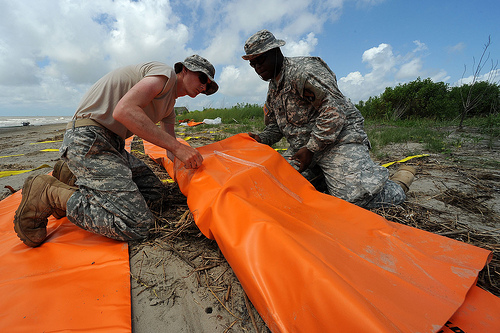 Image credit: The National Guard
Image credit: The National GuardIn early May, I wrote about the tragic BP oil spill. It has been over a month since the explosion, and oil is still leaking at an incredible rate. I wanted to take a look at recent news, attempted steps taken to correct the problem, and potential health implications.
Rumors have been spreading like wildfire about scandals in the Mineral Management Services (MMS), which is the agency that oversees offshore drilling. As of Thursday, Director Elizabeth Birnbaum is no longer in charge of the MMS. Bob Abbey, the Director of the Department of Interior's Bureau of Land Management has been named as the interim director.
But the greatest scandal is still the risk posed to the health of humans and the environment. BP has tried a number of strategies to plug the leak that have failed. The most recent approach is called 'top kill', which involves the use of materials such as densely packed mud to plug the leak. Friday was the third day BP attempted to use top kill, but by the end of the day not much progress was made.
Thursday, estimates confirmed worst fears that the leak in the Gulf of Mexico is now the largest oil spill in U.S. history. Federal officials suggest that the rate of oil is 2 to 5 times higher than they previously thought, with between 12,000 to 19,000 barrels a day leaking each day.
This realization of the sheer magnitude of oil that is pouring into the Gulf increases the urgency of remediation efforts to protect fragile ecosystems and the health of Americans. However, we must also be certain that remediation strategies themselves are safe. Clean-up attempts have been made using booms to trap the oil, controlled burns, and chemical dispersants.
However, all methods have the potential to impact on our health and the environment if not used correctly. One key example, is recent discoveries of problems associated with the chemical dispersants. Several workers have complained about health effects, such as nausea and elevated blood pressure. Just last week, the EPA told BP to stop using one of the dispersants and to switch to a safer alternative. One person I spoke with who visited the spill told me that the smell of the chemicals were actually worse than the smell of the oil.
It is now up to the Obama administration to ensure that the clean-up efforts are not a greater health problem than the initial spill.



The top kill failed. They're trying something else. This is really, really not cool. http://www.nytimes.com/2010/05/30/us/30spill.html?hp
ReplyDeleteEvidence of what you were talking about--fishermen sick from dispersants.
ReplyDelete